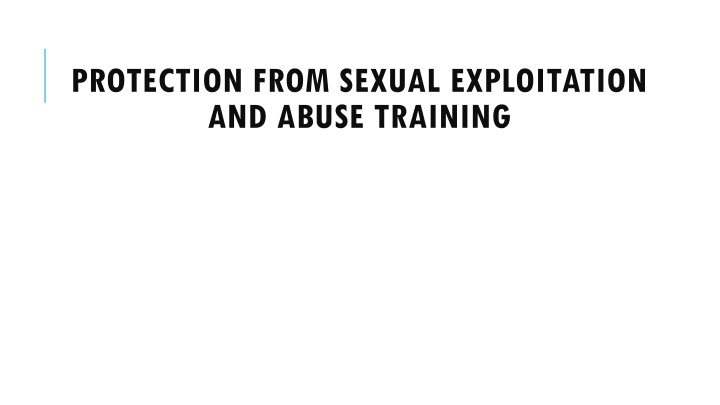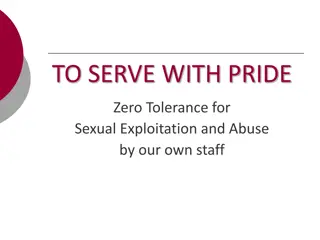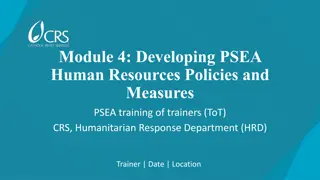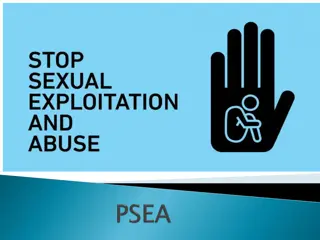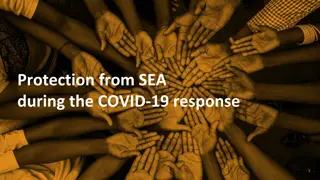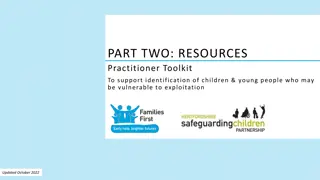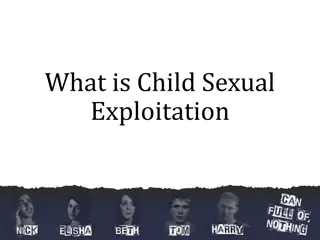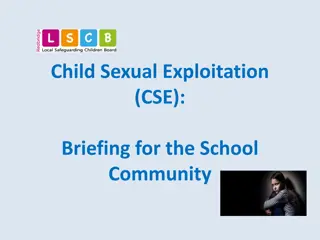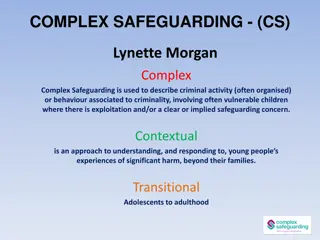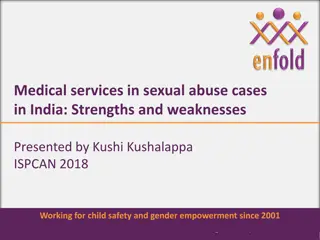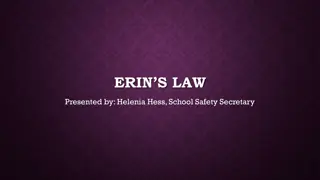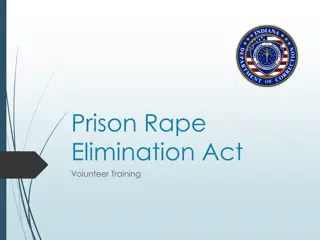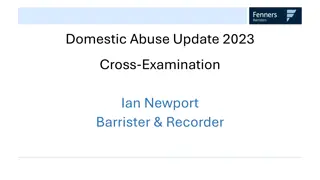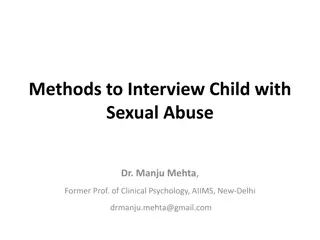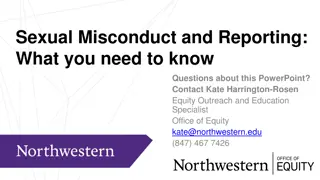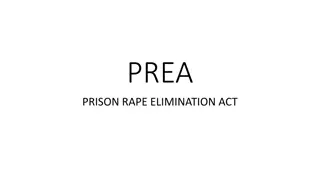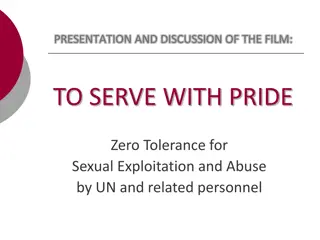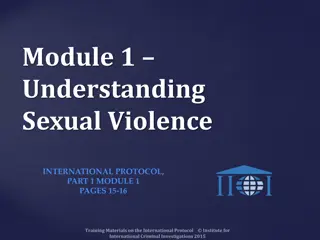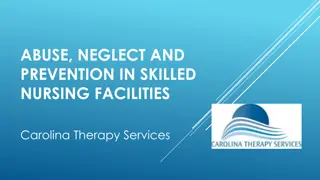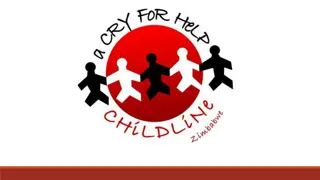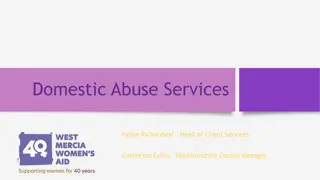Comprehensive Training on Protection from Sexual Exploitation and Abuse
This training program covers the history, key concepts, zero tolerance principles, roles and responsibilities, risk factors, consequences, community-based complaints mechanisms, human resources, protection of whistleblowers, and mandatory reporting related to protection from sexual exploitation and abuse. It also delves into the definitions of sexual abuse, differences between SEA and sexual harassment, and key events in the history of PSEA initiatives.
Download Presentation

Please find below an Image/Link to download the presentation.
The content on the website is provided AS IS for your information and personal use only. It may not be sold, licensed, or shared on other websites without obtaining consent from the author.If you encounter any issues during the download, it is possible that the publisher has removed the file from their server.
You are allowed to download the files provided on this website for personal or commercial use, subject to the condition that they are used lawfully. All files are the property of their respective owners.
The content on the website is provided AS IS for your information and personal use only. It may not be sold, licensed, or shared on other websites without obtaining consent from the author.
E N D
Presentation Transcript
PROTECTION FROM SEXUAL EXPLOITATION AND ABUSE TRAINING
TRAINING OUTCOMES AND LEARNING OBJECTIVES i) Outline the history of PSEA ii) Define key concepts and discuss on scenarios iii) Zero Tolerance on PSEA (6 Core Principles) iv)` Roles and responsibilities of personnel in preventing and responding to PSEA v) Factors contributing to increased risk of SEA and sexual harassment # of staff. vi) Consequences of SEA on the survivor(s)the s community the# organization and other
TRAINING OUTCOMES AND LEARNING OBJECTIVES viii) Community-Based Complaints Mechanisms (CBCMs) & community awareness raising ix) Reducing risks through human resources x) Protection of whistleblowers, subject of complaints and survivors xi) Outline Mandatory Reporting and the reporting process
HISTORY OF PSEA i) First allegations of SEA by Humanitarian workers in 2002 in a study by UNHCR and Save the Children Formation of PSEA Inter Agency Task Force established Plan of Action with six (6) core principles later adopted by High Level UN Meeting in 2006 in New York In 2003 The Secretary General issued a Special Bulletin on Special Measures for Sexual Exploitation and Abuse reaffirms the 6 core principles and the role of UN and Implementing Partners 2009 IASC provided more guidelines on Elimination of PSEA and endorsed the 6 core principles ii) iii) iv)
DEFINITIONS sexual abuse sexual abuse means the actual or threatened physical intrusion of a sexual nature, whether by force or under unequal or coercive conditions.
SEA VS. SEXUAL HARASSMENT SEA occurs against a beneficiary or vulnerable member of the community. Sexual harassment occurs when one employee makes continued, unwelcome sexual advances, requests for sexual favors, and other verbal or physical conduct of a sexual nature, to another employee, against his or her wishes. 6
DEFINITIONS Term Sexual Abuse Who is involved? UN/(I)NGO staff and a beneficiary What is involved? - physical intrusion of a sexual nature - use of force or coercion Sexual Exploitation UN/(I)NGO staff and a beneficiary - abuse of vulnerability / differential power - victim s sexual activity with another person generates monetary, social or political profit for the exploiter Sexual Harassment UN/NGO staff against another staff - unwelcome advance/conduct of sexual nature - creates an intimidating environment/becomes a condition of employment
UNDERSTANDING SEA SEA is rooted in power differences and unequal relationships SEA is committed by people in positions of power. These people might include teachers, soldiers, police & humanitarian aid workers Consent does not determine whether SEA has occurred or not. Because victims of SEA have unequal power, they may feel forced to agree (to receive food, to protect their families, etc.)
WHAT IS THE DIFFERENCE BETWEEN SEA & GBV? Gender-based violence (GBV) is an umbrella term for violence that is perpetrated against someone because of his/her gender. GBV can be perpetrated against men and boys, but it disproportionately & systematically affects girls and women due to inequalities faced on the basis of gender. Sexual and GBV includes other forms of sexual violence based on power imbalances child sexual abuse etc SEA can be seen as a type of SGBV, as victims of SEA are often abused because of their vulnerable status, particularly women and girls. 10
CORE PRINCIPLE 1 SEA CONSTITUTE ACTS OF GROSS MISCONDUCT AND ARE GROUNDS FOR TERMINATION OF EMPLOYMENT
CORE PRINCIPLE 2 SEXUAL ACTIVITY WITH CHILDREN (PERSONS UNDER THE AGE OF 18) IS PROHIBITED
CORE PRINCIPLE 3 EXCHANGE OF MONEY, EMPLOYMENT, GOODS, OR SERVICES FOR SEX IS PROHIBITED
CORE PRINCIPLE 4 SEXUAL RELATIONSHIPS BETWEEN UN/INGO STAFF AND BENEFICIARIES ARE STRONGLY DISCOURAGED
CORE PRINCIPLE 5 STAFF MEMBERS MUST REPORT CONCERNS REGARDING SEA BY A FELLOW WORKER
CORE PRINCIPLE 6 UN/(I)NGO STAFF MEMBERS, ESPECIALLY THOSE IN LEADERSHIP POSITIONS, ARE OBLIGED TO CREATE AND MAINTAIN AN ENVIRONMENT THAT PREVENTS SEA
WHEN & WHO THESE BEHAVIORS APPLY TO All UNIDOR staff, partners, vendors, volunteers and temporary workers This behaviour applies on duty and off duty. You represent UNIDOR during your free time as well. You need to report, even if only a suspicion of misconduct or a rumour. You do not need evidence to report. 17
For the Community For the Victim For the Organization, IOM staff & other humanitarians Loss of trust from the community loss of funding For the perpetrator Loss of trust Physical harm STIs/HIV WHAT ARE THE CONSEQUENCES OF SEA? Stigmatised/ excluded children breakdown of support structures fear, confusion, depression, PTSD Conflict Infertility, unwanted pregnancy, abortion death, self harm STDs; HIV/AIDs loss of employment/income psychological harm, suicidal thoughts, security risk loss of reputation loss of staff shame Rejection by spouse/family loss of reputation, shame, guilt Security risk rejection by spouse/family Stigmatisation ostracised by the community loss of employment/income loss of access to education/opportunity or inability to attend school/work Safety/security risks
CORE MESSAGES 1. 1. WHY? WHY? SEA inflicts serious harm on those we seek to protect. The humanitarian workers who are responsible for providing assistance and protection become the abuser. The security risks for our staff and communities is a serious concern, and can result in loss of trust of the community, and our donors. 2. Sexual exploitation and abuse is an act of gross misconduct that could result in termination of contract for the staff and in some cases referral to criminal prosecution. 3. Conduct that is expected: 1) no sexual activity with children under 18 years, 2) no exchange of sex or sexual favours for goods, services, employment, 3) avoid relationships with crisis-affected populations, 4) to report if you see this kind of behaviour immediately, 5) all staff to create an environment that prevents SEA.
WHAT examples are considered SEA? Read your case study: 1. Has the Code of Conduct been breached? If so, what rule has been broken? 2. What would you do next?
WHY DO WE ALL HAVE TO ABIDE BY THIS BEHAVIOUR? Let s discuss what are the consequences of these behaviors, know as sexual exploitation and abuse. We are here to protect and support populations, not reinforce behaviour that is harmful to the most vulnerable, especially women and girls.
THE PSEA SYSTEM IN SOUTH SUDAN - The UN Country Team established the National PSEA Task Force which established a hotline and an email address for complaints - The UNCT National PSEA Task Force recently incorporated NGO membership into the structure at the national level although this is already happening at the field level. - At the field level 18 Community Based Complaints Mechanisms have been started and they are working together to create awareness in the community, establish referral pathways for survivors (which are primarily the same as those for GBV survivors) - This system is supposed to support reporting and accountability because partners have to provide updates often on cases being handled.
RISK FACTORS - There are a number of reasons why there is an increase of SEA cases - In groups discuss what are the different factors that contribute to the increase of SEA cases
RISK FACTORS -a) staff attitudes b) vulnerability of the population c) power imbalance that is at the root of the relationships existing between humanitarian actors and the affected population d) Lack of awareness on SEA and the problematic aspects of it e) Lack of risk assessments and mitigation measures set up to guard against SEA - In groups discuss what are the different factors that contribute to the increase of SEA cases
REPORTING, CONFIDENTIALITY, DATA PROTECTION & INVESTIGATIONS All staff members have a duty to report misconduct Organizations have a responsibility to protect staff members who are whistleblowers against retaliation Inform your supervisor Contact the office mandated to investigate in your organization as per the requirements of your Code of Conduct.
REPORTING SEA TO WHOM? All humanitarian staff are obligated to report concerns or suspicions of SEA Internal External Other humanitarian staff South Sudan National PSEA task force South Sudan Hotline: 0912 100 012 or 0959 401 425 E-mail: Your supervisor PSEA focal point Country Director Ethics & conduct office National PSEA TF for accountability pseass@unfpa.org
REPORTING : WHAT AND HOW? When you report: Be factual and specific Provide all evidence you have Report in writing (an oral report is possible as a first step) After reporting, respect confidentiality and don t discuss your report with anyone Your responsibility is limited to reporting and respecting confidentiality Refer to your code of conduct on the unit or department responsible for any investigation
REPORTING MISCONDUCT Sharing concerns and suspicions may feel uncomfortable Staff who report misconduct in good faith will be protected against retaliation Reporting protects innocent victims and is not a betrayal of colleagues Good faith. If a good faith allegation turns out to be false, you will not face repercussions Bad faith. Allegations reported in bad faith (knowing that it is false) are misconduct and subject to disciplinary measures
DATA PROTECTION Save the report with a password before sharing and do not put details of the complainant or the alleged perpetrator in the title Share the password separately and possibly via a separate channel Do not copy un-necessary people should be on a need to know basis Store hard copies in a file that is kept in a lockable drawer/cabinet that is not easily accessed by anyone coming into the office Do not give the file/folder obvious names e.g. PSEA CASES and do not have the names of the individuals on top of the file
CONFIDENTIALITY Information on cases should be shared on a need to know basis Cases should not be discussed in staff meetings and definitely do not mention names Never promise survivor complete confidentiality as this is not going to be possible Avoid asking too many questions but only what is necessary to fill out the forms Explain limitations of confidentiality and the procedures
PROTECTION OF WHISTLEBLOWERS Safety and risk plan should be set Confidentiality should be maintained Consider relocation options Discuss with protection partners
ETHICAL AND SAFE RESPONSE - The first step is ensuring you have the referral pathway in place - The second step is that service providers should be informed and trained on service provision - The third step is to ensure that staff are trained in PFA and are able to follow the principles in handling cases.
PFA: LOOK Address urgent basic needs (urgent medical care, glass of water, blanket, clothes if lost, torn, stained or removed) Allow the survivor to approach you. Listen to their needs and support them with statements such as: You seem to be in a lot of pain right now, would you like to go to the health clinic? We can continue talking afterwards. Does this place feel safe for you? Is there another place where you would feel safer? Do you feel comfortable having a conversation here? Would you like a glass of water? Please feel free to have a seat. Prioritize access to emergency health care, especially if life-threatening (form 8 is not needed!)
PFA: LISTEN Avoid WHY, questions, can feel like they are placing blame on the survivor. Instead, just listen or, if needed, ask questions such as what would you like me to do to help? or how would you like me to support you? What to say/do I m sorry this happened to you. What happened was not your fault. Thank you for sharing your experiences with me. Our conversation will stay between us. I will not share anything without your permission and only with people that need to know to support you. I will try to support you as much as I can, but I am not a counselor. My role is to provide you with information on what I know is available for you. There is no pressure to say anything you do not want to or do not feel comfortable saying. If survivors is a child, ask the child, if she/he wants anyone to be with her/him while she/he talks with you. If she/he want, make arrangement to bring the person. Be calm and patient allow for the child to be heard. Do not display shock or disbelief. Pay attention to your non-verbal communication.
PFA: LINK Make sure you have accurate, up-to-date information on the services, how to access them, or service gaps. What to say/do There are some people/organizations that may be able to provide some support to you and/or your family. Would you like to know about them? Here are the details of the service including the location, times that the service is open, the cost (if applicable) and the person s name for who you can talk to. Is there anyone that you trust that you can go to for support, maybe a family member or a friend? Would you like to use my phone to call anyone that you need at this moment? Do not feel pressure to make any decisions now. You can think about things and always change your mind in the future.
PFA: DO NOT DO NOT ignore someone who approaches you & shares that they have experienced violence. DO NOT force help on people by being intrusive or pushy. DO NOT overreact. Stay calm. DO NOT ask questions about what happened. Instead, listen and ask what you can do to help. DO NOT pressure the survivor into sharing more information beyond what they feel comfortable sharing. The details of what happened and by whom are not important or relevant to your role. DO NOT write anything down, take photos of the survivor, record the conversation on your phone or other device, or inform others including the media. DO NOT share the details of the incident and personal identifiers of the survivor with anyone. This includes the survivor s family members, police/security forces, community leaders, colleagues, supervisors, etc. Sharing this information can lead to more harm. DO NOT make comparisons between the person s experience & others. Do not communicate that the situation is not a big deal or unimportant. What matters is how they feel about their experience.
PFA: DO NOT (CONTINUED) DO NOT doubt or contradict what someone tells you. Remember your role is to listen and to provide information on available services. DO NOT exaggerate your skills, make false promises or provide false information. DO NOT offer your own advice or opinion on the best course of action or what to do next. DO NOT assume you know what someone wants or needs. Some actions may put someone at further risk of stigma, retaliation, or harm. DO NOT make assumptions about someone or their experiences, and do not discriminate for any reason including age, marital status, disability, religion, ethnicity, class, sexual orientation, gender identity, identity of the perpetrator(s) etc. DO NOT try to make peace, reconcile or resolve the situation between someone who experienced GBV and anyone else (such as the perpetrator, or any third person such as a family member, community committee member, community leader etc.) DO NOT ask about or contact the survivor after you end the conversation. Do not engage in repeated sessions or meetings with survivor, counseling or attempt for follow-up!
THANK YOU ANY QUESTIONS
